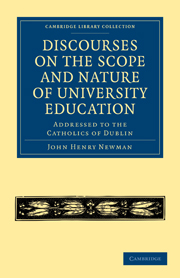Book contents
- Frontmatter
- PREFACE
- Contents
- CORRIGENDA
- Discourse I Introduction
- Discourse II Theology a Branch of Knowledge
- Discourse III Bearing of Theology on other Branches of Knowledge
- Discourse IV Bearing of other Branches of Knowledge on Theology
- Discourse V General Knowledge viewed as One Philosophy
- Discourse VI Philosophical Knowledge its own end
- Discourse VII Philosophical Knowledge viewed in relation to Mental Acquirements
- Discourse VIII Philosophical Knowledge viewed in relation to Professional
- Discourse IX Philosophical Knowledge viewed in relation to Religion
- Discourse X Duties of the Church towards Philosophy
- Appendix
Discourse VII - Philosophical Knowledge viewed in relation to Mental Acquirements
Published online by Cambridge University Press: 05 July 2011
- Frontmatter
- PREFACE
- Contents
- CORRIGENDA
- Discourse I Introduction
- Discourse II Theology a Branch of Knowledge
- Discourse III Bearing of Theology on other Branches of Knowledge
- Discourse IV Bearing of other Branches of Knowledge on Theology
- Discourse V General Knowledge viewed as One Philosophy
- Discourse VI Philosophical Knowledge its own end
- Discourse VII Philosophical Knowledge viewed in relation to Mental Acquirements
- Discourse VIII Philosophical Knowledge viewed in relation to Professional
- Discourse IX Philosophical Knowledge viewed in relation to Religion
- Discourse X Duties of the Church towards Philosophy
- Appendix
Summary
It were well, if the English, like the Greek language, possessed some definite word to express simply and generally, intellectual proficiency or perfection, such as “health”, as used with reference to the animal frame, and “virtue”, with reference to our moral nature. I am not able to find such a term;—talent, ability, genius, belong distinctly to the raw material, which is the subject-matter, not to the excellence which is the result, of exercise and training. When we turn, indeed, to the particular kinds of intellectual perfection, words are forthcoming for our purpose as, for instance, judgment, taste, and skill; yet even these belong, for the most part, to powers or habits bearing upon practice or upon art, and not to any perfect condition of the intellect, considered in itself. Wisdom, again, which is a more comprehensive word than any other, certainly has a direct relation to conduct, and to human life. Knowledge, indeed, and Science express purely intellectual ideas, but still not a state or habit of the intellect; for knowledge, in its ordinary sense, is but one of its circumstances, denoting a possession or influence; and science has been appropriated to the subject matter of the intellect, instead of belonging at present, as it ought to do, to the intellect itself.
- Type
- Chapter
- Information
- Discourses on the Scope and Nature of University EducationAddressed to the Catholics of Dublin, pp. 201 - 240Publisher: Cambridge University PressPrint publication year: 2010First published in: 1852

